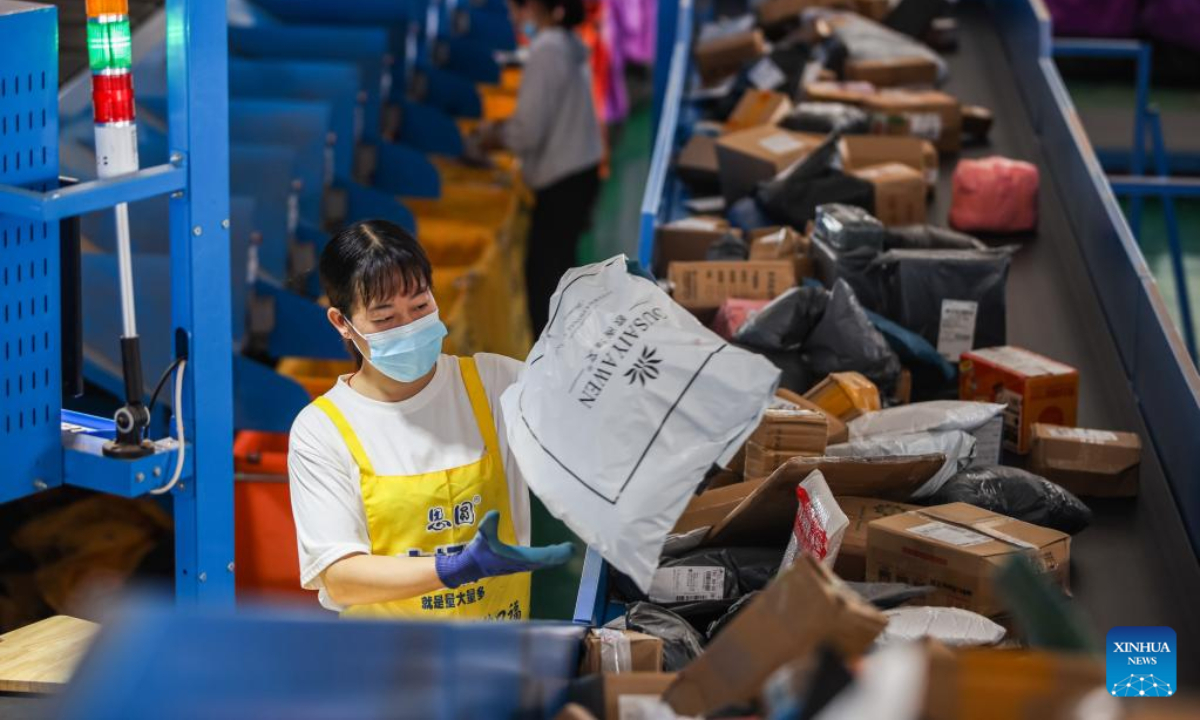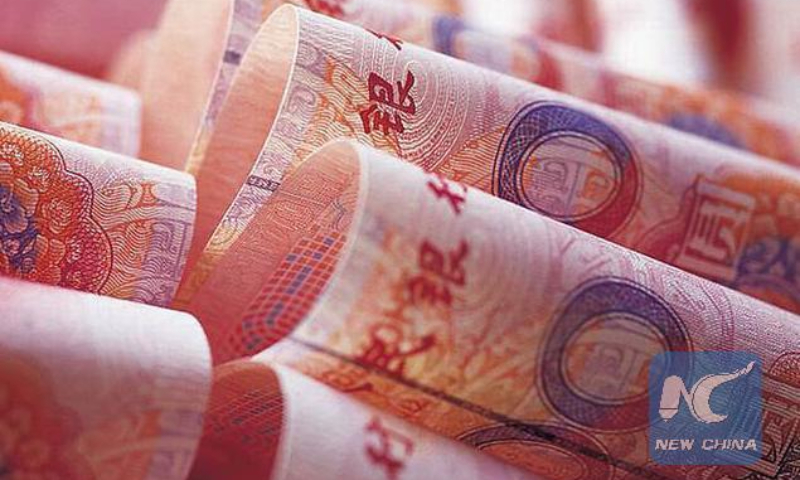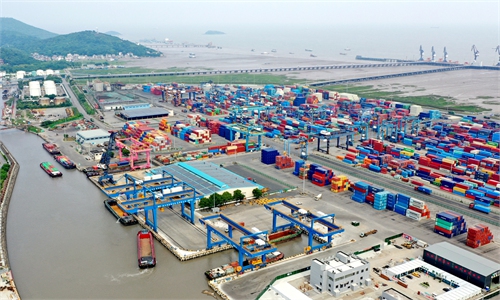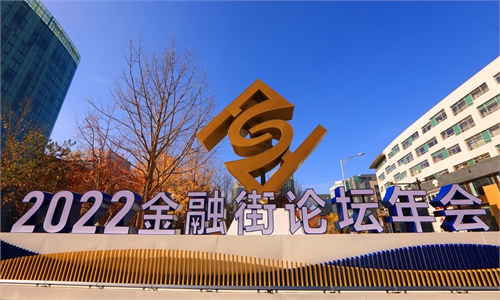
A worker is busy in a workshop of Harbin Turbine Company Ltd. of Harbin Electric Corporation in Harbin, northeast China's Heilongjiang Province, May 7, 2022. Photo:Xinhua
China will conduct its fifth national economic census in 2023 to take stock of the country's economic and social development, a move that comes as the country braces for a slew of tone-setting economic symposiums in December, including the annual Central Economic Work Conference, which will lay out the macroeconomic policy foundation for a head start next year.
As the world's second-largest economy - currently in its third year combating coronavirus and which has been constantly refining its COVID prevention measures to strike a balance between the epidemic control and economic growth, the string of meetings will funnel much-needed optimism to stabilize market expectations and inject confidence, which "could be more precious than gold" against unprecedented headwinds next year ranging from a global recession to a financial storm, observers said.
A thorough picture of the Chinese economy based on the latest national economic census also offers a gauge of its indigenous growth potential in emerging sectors such as new energy and digital economy, spelling out new impetus for the country's top priority pursuit of high-quality development to build Chinese modernization, analysts believed.
In recent days, bullish sentiment on the Chinese economy has been steadily building up, visibly in the consecutive gains Chinese stocks recorded and foreign companies' dialed-up investment plans in China. The rising confidence also serves as an ironic contrast to Western politicians' vilification of China's anti-epidemic measures, analysts said.

A staff member distributes parcels at the workshop of a logistics company in Lanshan County of Yongzhou City, central China's Hunan Province, Nov 10, 2022. Photo:Xinhua
Injecting optimism
The upcoming national economic census will include an input-output survey, the State Council, China's cabinet, said in a notice issued on Thursday.
The census will cover all legal entities, industrial activity units and self-employed households engaged in secondary and tertiary industry activities in China. The survey aims to objectively reflect China's new progress in such areas as promoting high-quality growth, constructing new development patterns and building a modern economic system.
"It is a regular survey, conducted every five years as usual, but it comes at a special time as China, entering the third year of its fight against the epidemic, is in urgent need of a renewed appraisal to gauge the soundness of economic operations," Tian Yun, former vice director of the Beijing Economic Operation Association, told the Global Times on Friday.
He noted that the census conducted back in 2018 revealed that the property industry was sitting at an extremely high debt level, and since then, Chinese policymakers have been making efforts to deleverage the sector.
"Now, we need to form an understanding of the extent to which the real estate issue has been improved, while also taking note of the emerging weak link of the economy and industrial chain, such as in the semiconductor and high-tech sectors, based upon which policymakers will roll out corresponding prescriptions to address them," Tian explained.
It is also hoped that the new census will offer a further glimpse into China's economic potential, as the 2018 survey did not capture emerging businesses such as livestreaming sales, digital economy and other services sectors, or other advanced manufacturing and new-energy industries, Cong Yi, dean of the School of Marxism at the Tianjin University of Finance and Economics, told the Global Times on Friday.
Cong stressed the necessity of conducting a new round of census as the lack of such data on entire economic activity will further impact decision-making on industrial policy optimization and adjustment.
The census is set to add to a flurry of closely-watched key conferences that take place the same month, including the meeting of the Political Bureau of the CPC Central Committee in early December and the annual Central Economic Work Conference scheduled in mid-December, which will shed light on the economic path forward.
In cities hit hardest by the new round of Omicron outbreaks, such as Guangzhou, the bustle of activity has returned and factories are humming again, after China continues to optimize anti-epidemic policies in accordance with the newly released 20 prevention and control measures in recent days.
On Thursday, Chinese Vice Premier Sun Chunlan underlined the importance of continuously optimizing China's response to COVID-19. This follows similar remarks she made on Wednesday that the country is facing a new situation and new tasks in epidemic prevention and control, as the pathogenicity of the Omicron virus weakens.
"It is a positive sign, boding well for the recovery momentum. The slew of key meetings will offer opportunity to get a better glimpse of future policy priorities and direction from the top authorities," Tian said.
Tian stressed that it is also important how Chinese policymakers manage expectations. Short-term fluctuations are not intimidating as long as we know where China is heading in the long term, he explained.

File photo: Xinhua
Bullish sentiment
Yi Gang, the governor of the People's Bank of China, the country's central bank, said on Friday at a seminar via video that China has put "an accommodative monetary policy in place to help with economic recovery and maximize employment."
According to predictions from observers, the priority for next year's economic policy is to further coordinate economic growth with COVID prevention measures so as to sustain internal economic drivers such as consumption, given a looming global recession, an international financial storm for which the US is the culprit, and other unprecedented geopolitical uncertainties.
Tian said that excluding all external factors, China's GDP could still expand by at least 4 percent next year, which "would be a stunning achievement" in global terms at that time.
According to a report by the World Bank, global GDP growth will slow to 0.5 percent in 2023, with a 0.4 percent contraction in per capita terms, which would meet the technical definition of a global recession.
Wang Guangfa, a respiratory expert at Peking University First Hospital, told the Global Times on Friday that the recent optimized COVID-19 response in many cities is aimed at striking a better balance between COVID-19 prevention and ensuring normality in people's lives, as well as daily production.
Since the current dominant Omicron strain has far weaker pathogenicity, sticking to the previous playbook in which cities with large numbers of cases have to put massive restrictions in place puts too much pressure on medical resources and deals a heavy blow to the economic activity.
"Our COVID-19 responses are gradually evolving in accordance with new situations," Wang said.
Amid the ongoing optimization of virus prevention measures, Chinese stocks have recorded rallies for consecutive days, while Wall Street banks are also largely elevating their forecasts of Chinese market earnings.
US investment bank JPMorgan has forecast a 9-10 percent jump in Chinese stocks by the end of next year "if confidence begins to return," media reported.
On Friday, Switzerland-headquartered robotics company ABB launched a new robot plant in Shanghai. This comes on the heels of German multinational chemical company BASF's inauguration of a new plant in Zhanjiang, South China's Guangdong Province in September.



